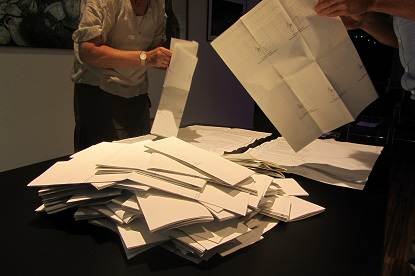Evaluation of the 2017 elections to the House of Representatives
The new Government needs to develop a new ballot paper model soon after taking up their duties. It should also be possible to electronically count the ballet papers using scanning equipment. This can help to prevent counting errors at polling stations and can relieve polling staff of their duties. These are two of the recommendations of the Electoral Council included in its evaluation recommendation following the recent elections to the House of Representatives. The Council further proposes that the official reports from all polling stations are published on the internet.

The elections to the House of Representatives held on 15 March 2017 were special elections in several respects. It started with an exceptionally large number of registered appellations of political parties, namely 81. For the first time, the nomination of candidates by parties took place with the Electoral Council at a central level. Shortly before Election Day, Minister Plasterk (the Interior and Kingdom Relations) decided that the usual election software should only be used as a computational tool and that the voting results should not be exchanged in digital form. Although a record number of Dutch people voted from abroad, it again proved that the procedure for this is far from optimal. On Election Day, various municipalities appeared to have a shortage (or impending shortage) of ballot papers. The Electoral Council hopes that the municipalities have learned from this and that this problem will not occur again in the future.
New ballot paper
Objections have been raised about the current ballot paper. Its large size makes it difficult for printers/municipalities to print it or to print additional copies, the ballot boxes are full more quickly and the votes are more difficult to count for polling staff. Voters sometimes have difficulties finding the candidate of their choice and some voters worry that other people will be able to get an (overall) impression of their voting preference if they open their ballot paper up. A previous attempt to develop a new ballot paper was unsuccessful in the House of Representatives. The Electoral Council hopes that the new Government will make a new attempt.
Electronic counting
The counting process at the polling stations calls for improvement. Manual counting requires a lot of effort from the polling staff, and errors are inevitable when counting this way. Improved control of this and of filling in the official reports can help, but the Council believes a structural improvement can be made by introducing electronic counting using scanning equipment. The Electoral Council urges that further experiments should be undertaken using this equipment.
Software
After media reports about possible vulnerabilities in the software used to support the election process, Minister Plasterk decided that it was not allowed to digitally transfer voting results from municipalities to principal electoral committees and from principal electoral committees to the central electoral committee. This meant that both the principal electoral committees and the central electoral committee needed to re-enter all the voting data using the software. This was an enormous job that also involved vulnerabilities. Based on the security report provided by Fox-IT on behalf of the Electoral Council, the Electoral Council considers it important to implement improvements in the security of supporting software before the redivision elections take place.
Transparent election results
Transparency provides an important guarantee for a clean election process. Knowing that the official reports from the polling stations form the basis of the final election results, the Electoral Council advocates the publication of these official reports on the internet. The Electoral Council believes that this will also make it possible to address criticism and objections against the use of election software. Publishing the official reports from the polling stations online – the publication of the official reports from the principal electoral committees and the central electoral committee is already mandatory – means that all voting results will be transparent and therefore verifiable by all.
Publication of election results
For years, the Electoral Council has collected the results of elections held in the Netherlands and placed them on its website: www.verkiezingsuitslagen.nl. This has been possible in recent years because the Council automatically received election results up to the level of the polling stations due to the use of election software. At the last elections to the House of Representatives, this was not the case because data was no longer digitally exchanged in determining the results. The Electoral Council therefore repeats its previous recommendation to define in the Electoral Act that the Council is also tasked with collecting election results.
Supervising elections
The Electoral Council urges that investigations should take place in order to improve the supervision of the implementation of the election process. If there are incidents – such as voting or counting not running smoothly at a particular polling station – an appeal is often made to the Electoral Council. However, the Council is not officially in charge of supervising elections.
Shortening the period for rectifying omissions in lists of candidates
The Electoral Council had to suspend the public session in which it decided on the validity of the lists of candidates because the preparatory work could not be completed in time. This was due to the large number of participating parties and because under the Electoral Act, parties were able to rectify omissions in the lists of candidates up to one hour before the meeting. The Council recommends shortening the period for rectifying omissions by one day in order to provide more time to prepare for the public session.